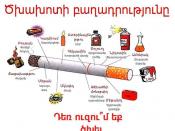What would a socially responsible tobacco company look like? It could certainly not be defined as such if it did not address the harm its products cause. It would be engaged in research and development seeking to develop less harmful versions of it product that would remain acceptable to its customers.
It would have a clear code of conduct about how it seeks to market it's products and to whom it would aim to tackle corruption and smuggling. It would ensure tobacco farmers worked in good conditions. (Baker, p1)
As recently as 1994, the companies' chief executive officers all swore before Congress that they did not know that smoking caused disease or believe it was addictive. Their scientists and lawyers knew and had been telling them so for decades.
The industry's campaign of coordinated subterfuge dates back nearly 50 years. In January 1954, after epidemiological research indicted smoking as a cause of lung cancer, a cabal of industry executives published the now infamous "Frank Statement to Cigarette Smokers" in more than 400 US newspapers.
The "frank statement" said, among other things, "We accept an interest in people's health as a basic responsibility, paramount to every other consideration in our business. ... We always have and always will cooperate closely with those whose task it is to safeguard the public health .... We are pledging aid and assistance to the research effort into all phases of tobacco use and health?. This solemn commitment was intended from day 1 to build a faccade behind which the industry could hide as it continued to challenge the scientific evidence, call for "more research," and characterize the relationship between smoking and disease as "controversial.? The profits from its death-dealing product were simply too great for the industry to honor its published commitment. (Warner, p897).
Arguments for holding tobacco companies responsible.
In 1965, the Surgeon General warned the public about the dangers of smoking and in 1969 health warning became mandatory on cigarette packets (Josefson, p1).
Any industry that produces a product needs a customer that is basic business 101. Most businesses use marketing to get people to try their product. The tobacco industry however, has added chemicals to their cigarettes that make the addiction more powerful and longer lasting. 3,000 chemicals can be found in tobacco smoke. Many of those chemicals found in cigarettes are known to be carcinogenic. Some of those known carcinogens are; benzene, cadium, chromium, nickel, radon, and vinyl chloride. (www.wordig.org) Nicotine the number one ingredient is now consider addictive by the FDA.
Smoking increases your chances of having a heart attack or stroke. Several ingredients in tobacco cause narrowing of your blood vessels which can lead to high blood pressure. In addition to upping your chances for having a heart attack or stroke, nicotine contained in cigarettes is considered highly addictive. (www.wordig.org) With this in mind how can cigarette companies deny their responsibility and negligence in selling these highly addictive substances to the general public?
Tobacco remains the leading preventable cause of death in the United States, with an annual death toll of more than 400 000--all, in theory, preventable. The poor, the less educated, and the disenfranchised smoke more than their better-off counterparts. Consequently, they suffer a disproportionate burden of tobacco -related illness and death. They are also the most exploited victims of predatory marketing practices that capitalize on their lack of education and other vulnerabilities.
States pay more than 17% of smoking-related health expenses through Medicaid programs. Investing in prevention, therefore, can result in long-term savings to states. Medicaid coverage to make smoking cessation affordable and accessible for the poor is crucial. Currently, 14 states offer no coverage at all. Comprehensive prevention and treatment plans will also save providers money in the long run. A study of health maintenance organization (HMO) expenses found former smokers' health care costs higher in their first year of quitting, but they are equivalent to those of continuing smokers in the second year, after which costs continue to drop. (Healton p1)
Tobacco companies have succeeded in addicting those who have the least information about the health risks of smoking, the fewest resources, the fewest social supports, and the least access to cessation services.(Keife, p149) Internal company documents, made public by suits against tobacco companies, suggest that this was a planned corporate strategy.(n2 ) One such document, entitled "Less Educated...Today's Trend...Tomorrow's Market?," highlights the importance of young adults with lower education levels to future profits.(n3)
In 1998, 46 state attorneys general signed a landmark settlement agreement with the tobacco industry called the Master Settlement Agreement (MSA). The MSA compensated states for costs incurred in providing treatment to those who suffered smoking-related illnesses. It provided funding for potential use in tobacco control to prevent young people from starting to smoke and to help current smokers quit.
The World Health Organization has suggested that tobacco -related morbidity will be the leading cause of preventable death for adults worldwide by 2030. Over 10 million US residents have died of tobacco-related illness since the 1964 Surgeon General's Report.(Healton p1)
Arguments against holding tobacco companies responsible.
According to the web site www.cancerwise.org interim results from a study they conducted show that there may be some genetic disposition toward people that contract lung cancer and those that don?t.
This study found that the risk of getting lung cancer for relatives of people that smoked nearly doubled and that there was no evidence to suggest that those that did not smoke would contract lung cancer. (www.cancerwise.org)
Researchers are attributing this predisposition to shared genes, shared exposures, or some combination of both. (www.cancerwise.org)
Author Joseph Kellard on the web site www.capmag.com states that it is each persons responsibility to know what actions to take or not to take transcends and that does not translate into what the anti-cigarette/smoking movement calls ?social responsibility? whereby the cigarette companies are responsible for personal actions.
In 1998 a California jury ordered two tobacco companies to pay a dying former smoker $20 million in punitive damages. This decision had marked the first time tobacco companies had been ordered to compensate an individual who began smoking after the Surgeon General?s warning appeared on cigarette packets (Josefson p1).
In June of 2001, Richard Boeken also of California was awarded $3 billion in compensation to be paid by Philip Morris. (Lancet, 2001) This is by far the largest amount paid any case of this sort worldwide. If he gets the money or not is another story. He is very ill and Philips Morris has decided to appeal.
In my opinion these two cases should have not even gone to court. If someone choices to smoke regardless of the warnings they were given then it should be their responsibility not the companies. Why should the tobacco companies be responsible if someone chooses to use their product? If the product is defective in some way and it caused an injury then that is a different story. But cigarettes are not defective so why should they be responsible?
No one forces anyone to smoke. They choose to smoke on their own. There are many people state that they started smoking when they were younger because of peer pressure.
There are many other things that are also done because of peer pressure but you do not have to do it. If you do you can make a conscience effort to stop.
Some people even though they have been diagnosed with cancer they still continue to smoke. So what gives them the right to sue the tobacco companies? Isn?t having the cancer enough to make you quit? If not than you should be responsible for yourself and no one else.
Cigarette companies are just like any other marketable business. They have to market their product in order to sell it. Just because they market it does not mean you have to buy it. How many other products are there that companies market? Do you buy all of them? Usually not, just the ones you want. So if you want cigarettes you are going to buy them.
I just feel that today too many people sue for the wrong reasons. I can see if a product is defective and you are injured or a company is negligent in revealing a problem with their and you are injured. Cigarettes are neither defective or are the companies negligent in revealing the hazard. My opinion is that if you want to smoke then you should take all responsibility that comes with it. Even if nicotine is consider an addictive drug by the FDA, there are many drug users that have gotten rehabilitated. Do they sue the drug dealer that sold them the drugs because they are addicted? If they did they would find themselves dead even before they had a chance to go to a lawyer.
Conclusion.
To read the cigarette manufacturers' Web sites, one would think the industry must be a wholly owned subsidiary of the Public Health Service. The sites warn about the dangers of smoking, say smoking is addictive, list chemicals added in manufacturing cigarettes, encourage smoke-free environments for nonsmokers, and offer smokers Web-based quitting resources. This is the face of the "new" tobacco industry, they tell us, committed to public health and to America's children. They have finally come clean, they would have us believe, after half a century of targeting kids and deceiving the public about their products' dangers. Their social commitment extends well beyond the issue of smoking, they inform us. Each company devotes millions of dollars to a variety of causes, including feeding the hungry, aiding victims of natural disasters, and protecting women who are victims of abuse (of the nonsmoking kind). In 2000, industry behemoth Philip Morris, with domestic tobacco revenues of $23 billion, spent $115 million on such worthy endeavors--and then spent an additional $150 million on a national advertising campaign to inform the public about the company's largesse.(n6)


